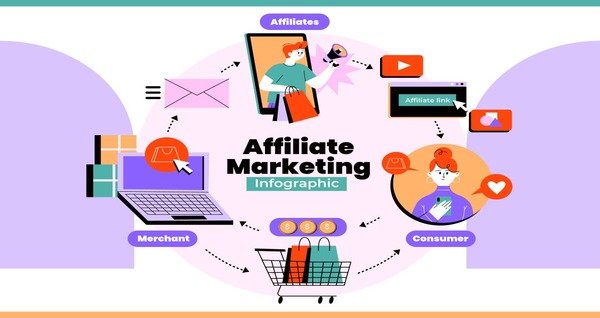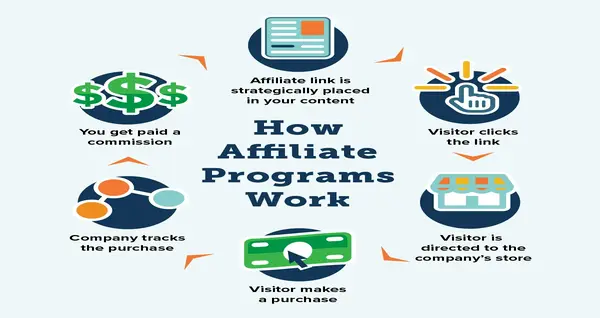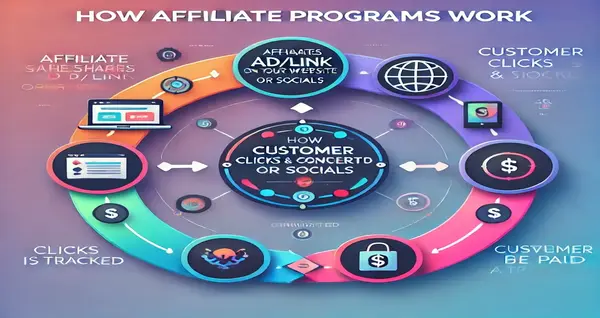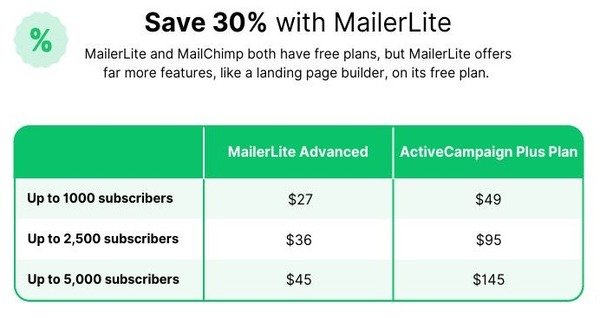EMAIL AT- support@itldigitaltech.com CALL AT- +8801830312344

Affiliate marketing is one of the most popular methods for individuals and businesses to generate passive income online. By promoting products or services and earning a commission for each sale or lead, affiliate marketers bridge the gap between companies and consumers. In this comprehensive guide, we’ll explore it, how it works, and how you can get started building a successful affiliate business.
Table of Contents
Understanding Affiliate Marketing
Affiliate marketing is a performance-based marketing strategy where affiliates (marketers) earn commissions by promoting other companies’ products or services. Key players in this ecosystem include:
Merchants: Companies or individuals who offer products or services for sale.
Affiliates: Marketers who promote the merchant’s products.
Consumers: Buyers who purchase products through affiliate links.
Affiliate networks: Platforms that connect affiliates with merchants and handle tracking, reporting, and payments.

How to Start Affiliate Marketing as a Beginner?
Affiliate marketing is a great way to make passive income online. As a beginner, follow these simple steps to get started on your affiliate marketing journey:
1. Choose a Niche
Focus on a specific niche that aligns with your interests and skills. Popular niches include health and fitness, technology, personal finance, and travel. A targeted niche helps you build trust and authority among your audience.
2. Research Affiliate Programs
Join affiliate programs that offer products or services relevant to your chosen niche. Look for programs with:
- Competitive commission rates
- Reliable tracking and reporting tools
- A strong reputation in the market
Examples of beginner-friendly affiliate programs include:
- Amazon Associates: Wide product range and ease of use
- ClickBank: Digital products with high commission rates
- ShareASale: A wide variety of merchants and products
3. Create a platform
Establish an online presence to promote affiliate products. Options include:
Blog or website: Create content-rich articles, tutorials, and reviews featuring affiliate links. Platforms like WordPress make it easy to get started.
Social media: Promote products via Instagram, TikTok, or YouTube by creating engaging content like unboxing videos or tutorials.
Email marketing: Build a subscriber list to recommend affiliate products through newsletters.
4. Create valuable content
Content is key to attracting and retaining an audience. Your content should:
- Solve a problem or answer a question in your niche.
- Highlight the benefits and features of the affiliate product.
- Include affiliate links naturally and transparently
For example, write product reviews, how-to guides, or comparison articles that help your audience make the right decision.
5. Drive traffic to your platform
Use strategies to attract visitors to your affiliate content:
Search engine optimization (SEO): Optimize your blog for relevant keywords to rank higher in search results.
Social media marketing: Share engaging posts to reach your target audience.
Paid advertising: Consider running targeted ads to increase traffic.
6. Monitor and optimize performance
Track your affiliate marketing efforts using analytics tools. Identify which products, content, or platforms are performing well and focus on optimizing them to increase conversions.
- Always disclose your affiliate partnerships to maintain trust.
- Focus on building relationships with your audience rather than just promoting products.
- Be patient—affiliate marketing takes time to see results.
- With consistent effort and valuable content, affiliate marketing can become a sustainable source of income.

How Affiliate Marketing Works
Affiliate marketing works on a simple revenue sharing model:
Affiliate Joins a Program:
Affiliates sign up for an affiliate program offered by a merchant or affiliate network.
Unique Tracking Links:
Once approved, affiliates receive unique links to promote the merchant’s products. These links track user activity via cookies.
Promotion:
Affiliates use blogs, social media, email marketing, or paid advertising to drive traffic to the merchant’s website.
Conversions and Commissions:
When a consumer clicks on the affiliate link and makes a purchase, the affiliate earns a commission based on the terms of the agreement.
Benefits of Affiliate Marketing
Low startup costs
Requires minimal upfront investment, making it accessible to beginners.
Passive income potential
Once content is created, affiliates can continue to earn commissions long after the initial promotion.
Flexibility
Affiliates can work from anywhere and choose products they truly believe in, creating a personalized marketing strategy.
No product management
Affiliates don’t need to worry about inventory, shipping, or customer service—it’s all handled by the merchant.
Types of Affiliate Marketing
Connected Affiliate Marketing
Affiliates promote products without a personal connection or prior use of the product.
Related Affiliate Marketing
Affiliates promote products within their niche, even if they have not personally used them.
Involved Affiliate Marketing
Affiliates endorse products they use and trust, often creating in-depth reviews or tutorials.
Choosing the Right Affiliate Program
Finding the right affiliate program is crucial to success. Consider the following:
Relevance: The product should align with your niche and audience interests.
Commission Rate: Higher commissions improve profitability, but consider the product’s conversion potential.
Cookie Duration: Longer cookie durations increase the likelihood of earning commissions.
Support and Resources: Look for programs that provide marketing materials and dedicated affiliate support.
Popular platforms include:
Amazon Associates: One of the largest and most accessible programs.
ShareASale: Features a variety of merchants across a variety of industries.
ClickBank: Known for digital products with high commission rates.
Strategies for Successful Affiliate Marketing
Build a strong online presence
Create a professional website or blog to showcase your expertise and host content that resonates with your target audience.
Focus on quality content
High-quality, value-driven content—like tutorials, product reviews, and how-to guides—builds trust and encourages conversions.
Leverage SEO strategies
Optimize your content with relevant keywords, meta descriptions, and backlinks to rank higher in search results.
Use social media marketing
Platforms like Instagram, TikTok, and Pinterest are powerful tools for affiliate promotion, especially for visually appealing products.
Experiment with paid advertising
Platforms like Google Ads and Facebook Ads allow you to target specific audiences, although careful budget management is essential.
Track performance metrics
Use analytics tools to measure click-through rate (CTR), conversions, and earnings per click (EPC) to refine your strategy.
How Email Marketing can help Affiliate Marketing?
Email marketing enhances affiliate marketing by building trust and relationships with your audience. It allows for targeted outreach through segmented lists, delivering personalized affiliate offers that increase engagement and conversions. Emails can highlight exclusive deals, share educational content, and subtly include affiliate links, encouraging clicks without being overly salesy. Automated email sequences ensure consistent exposure to offers, while performance tracking helps optimize campaigns. By providing valuable content and maintaining trust, email marketing not only drives traffic to affiliate links but also encourages long-term customer loyalty, maximizing revenue, and creating a measurable, passive income stream for affiliate marketers.

Suitable email marketing tools for Affiliate Marketing
Several email marketing tools are suitable for affiliate marketing, offering features like automation, segmentation, analytics, and compliance support. I used some of them. Among them I liked Mailerlite most for its features, services and rational price
MailerLite
Why it’s great: Affordable, beginner-friendly, and supportive.
Key features: Automation, landing page builder, segmentation, and an easy-to-use drag-and-drop editor.
Best Practices for Email Marketing in Affiliate Marketing:
Be compliant: Always disclose your affiliate relationships to comply with laws like FTC guidelines.
Provide value: Focus on providing valuable content rather than just promoting products.
Optimize for mobile: Make sure your emails look great and work well on mobile devices.
Monitor analytics: Track open rates, click-through rates, and conversions to refine your strategy.
By combining the targeted approach of email marketing with the earning potential of affiliate marketing, you can create a synergistic
Real-Life Examples of Affiliate Marketing Success
Pat Flynn (Smart Passive Income)
Flynn makes a decent income by sharing tools and services through her blog and podcast, focusing on transparent and authentic recommendations.
Wirecutter (acquired by The New York Times)
This website specializes in product reviews and generates revenue through affiliate links, demonstrating the potential of high-quality content.
Michelle Schroeder-Gardner (Making Sense of Sense)
Michelle has built a successful affiliate business through her personal finance blog, earning six figures per month by promoting courses and financial tools.
Challenges in Affiliate Marketing
High Competition
Popular niches can become saturated, making it difficult to stand out.
Evolving Algorithms
Changes in search engine and social media algorithms can impact traffic and revenue.
Merchant Dependency
Affiliates rely on merchants to accurately track sales and honor payments, which can sometimes lead to disputes.
Ad Blockers
Ad-blocking software can reduce visibility and affect click-through rates.
Future of Affiliate Marketing
Affiliate marketing continues to grow, with global spending expected to reach new heights in the coming years. Trends like influencer marketing, video content, and AI-powered analytics are reshaping the landscape, providing new opportunities for affiliates to innovate and thrive.
Conclusion
Affiliate marketing is a powerful way to make money online, offering flexibility and scalability for those willing to invest the time and effort. By choosing the right products, creating valuable content, and using digital tools, you can build a sustainable affiliate business. Whether you are a beginner or an experienced marketer, it has the power to transform your financial future.



